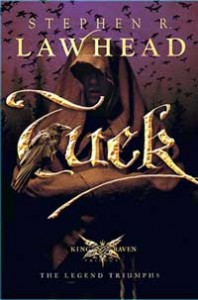
Tuck by Stephen R. Lawhead
Book Three of the King Raven Trilogy
Published by Thomas Nelson, 2009, 443 pages
Genre: Historic legend, Christian, young adult (high action, no sexy stuff)
Is this a fantasy book? Not really. There is only one character who has attributes that are truly larger than life: the Banfaith seer, Angharad. She appears to be several hundred years old, a Celtic seer in the tradition of Merlin, but of course her age isn’t pinned down, so who knows?
Are Arthurian legends fantasy? This book falls in the Arthurian vein, in that it is speculating about the possible history behind a legend.
Tuck is the final book of the King Raven trilogy, which is a long, wild yarn spun to answer the question, who might Robin Hood have been? Apparently the traditional location, Sherwood Forest, isn’t very conducive to a good semi-historical tale, at least as far as Lawhead is concerned. Now Lawhead, who has spent much of his career exploring Celtic culture and myth, is entertaining us by bringing his broad knowledge of the Cymry (Welsh) to the Robin Hood legend.
What if Robin Hood and his longbowmen were really Welsh resistance fighters, seeking to counter the heavy hand of William the Conqueror’s son William Rufus? Lawhead bases his three-volume tale on this supposition.
The first book, Hood, stands mostly in the point of view of Bran, the Robin Hood character. (Rhi Bran y Hud is what he is eventually called by his countrymen.) The second book, Scarlet, revolves around the point of view of Will Scarlet, who joins the outlaw band living in the ancient woods of the March, the eastern borderland of Wales. And the third, Tuck, contains much from the point of view of Father Aethelfrith, whom the legend calls Friar Tuck.
There are other familiar characters from the legend too: maid Marian becomes Merian, Bran’s headstrong beloved. Little John becomes Iwan. The evil sheriff of Nottingham becomes the ruthless Norman Sheriff de Glanville. And, like in the legend, the outlaw band members are adept at guerilla tactics, shooting the longbow, repeatedly besting their adversaries. Those adversaries come after them in far larger numbers as knights on horseback, carrying sword and spear. They nearly always lose. But the band of outlaws living in the woods suffers from hunger and privation, so they are not winning, either.
As the story progresses, Bran becomes more and more adept at fooling others–he is a trickster who masters the art of illusion. He’s using it to further his quest to gain his rightful throne as a petty Welsh king, and to aid his suffering countrymen where he can. Bran also leans heavily on his spiritual advisor, Angharad, and consistently makes decisions based on mercy rather than vengeance. It is Biblical thinking we hear from Angharad and Bran.
Meanwhile, William Rufus, Baron Neufmarche, and other Normans have been ruthlessly enforcing their domination and taxation on the poor citizens of Britain and parts of Wales. Their characters in previous books seem uniformly villainous and bullying. Double-crossing is the way they operate.
Will the band of outlaws succeed in convincing the Norman king that he should live up to his previous agreement and install Bran as his vassal? Will a daring excapade in the north of Wales convince Bran’s kinsmen to come to his aid? Read it to find out!
And what do I think?
It’s a great and riveting tale. Not only did the fantasy lovers in my household want to read it, but the historical fiction lovers too. What a gas, to reimagine Robin Hood in this totally different way.
However, the way that the plot resolves doesn’t seem believable to me. In particular two characters, the impetuous Merian and the cold William Rufus, act in a manner that seems out of character. Another character, Baron Neufmarche, also does some surprising things, but his change of heart is developed enough to be believable.
Also, Bran’s character in this book seems less real than in the previous books. He is just too successful at duping the enemy Normans, and too good at turning the other cheek. It’s as if he’s stepping into the realm of legend although he is still alive.
These reservations didn’t detract much, though. I heartily enjoyed reading this trilogy. It’s so good and satisfying to me to read a great tale with a solid Biblical worldview as its foundation. And who knows? Maybe Robin Hood really was a Welshman. Maybe Lawhead is onto something. But I guess we’ll never know.–Phyllis Wheeler
Take a look at what others on the Christian Science Fiction/Fantasy blog tour are saying about this book in the next three days:
Brandon Barr
Jim Black
Keanan Brand
Rachel Briard
Grace Bridges
Valerie Comer
Amy Cruson
CSFF Blog Tour
Stacey Dale
D. G. D. Davidson
Jeff Draper
April Erwin
Karina Fabian
Alex Field
Beth Goddard
Todd Michael Greene
Ryan Heart
Timothy Hicks
Christopher Hopper
Joleen Howell
Becky Jesse
Cris Jesse
Jason Joyner
Kait
Carol Keen
Krystine Kercher
Dawn King
Terri Main
Margaret
Melissa Meeks
Rebecca LuElla Miller
Caleb Newell
Eve Nielsen
Nissa
John W. Otte
John Ottinger
Epic Rat
Steve Rice
Crista Richey
Hanna Sandvig
Chawna Schroeder
James Somers
Robert Treskillard
Rachel Starr Thomson
Steve Trower
Speculative Faith
Fred Warren
Phyllis Wheeler
Jill Williamson

Pingback: Posts about Christian Fiction as of May 18, 2009 | Aggi Pursued
Pingback: God and Fiction – A Look at Tuck « A Christian Worldview of Fiction
Ha! I have to admit, when I finished reading it, I had that same thought … I wonder if this could really haves an element of truth to it.
Very fun book, and interesting history mixed in with the myth.
Becky
Pingback: Tuck – A Review « A Christian Worldview of Fiction
Pingback: CSFF Bloggers Review Stephen Lawhead | The Christian Fantasy Review
Great review, Phyllis! You’re site’s the best.
Thanks, Robert!
Pingback: What Constitutes Deus ex Machina? « Speculative Faith